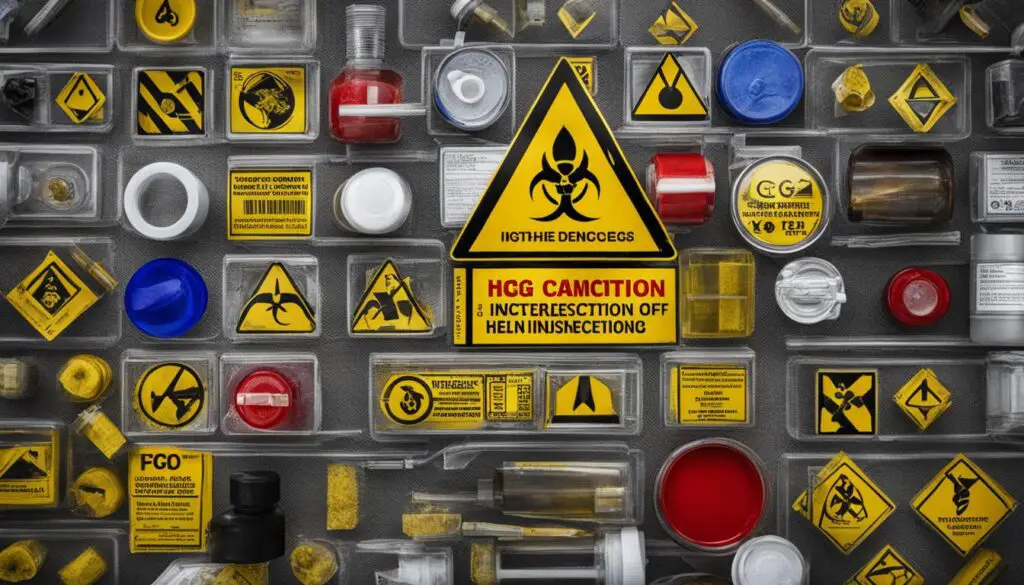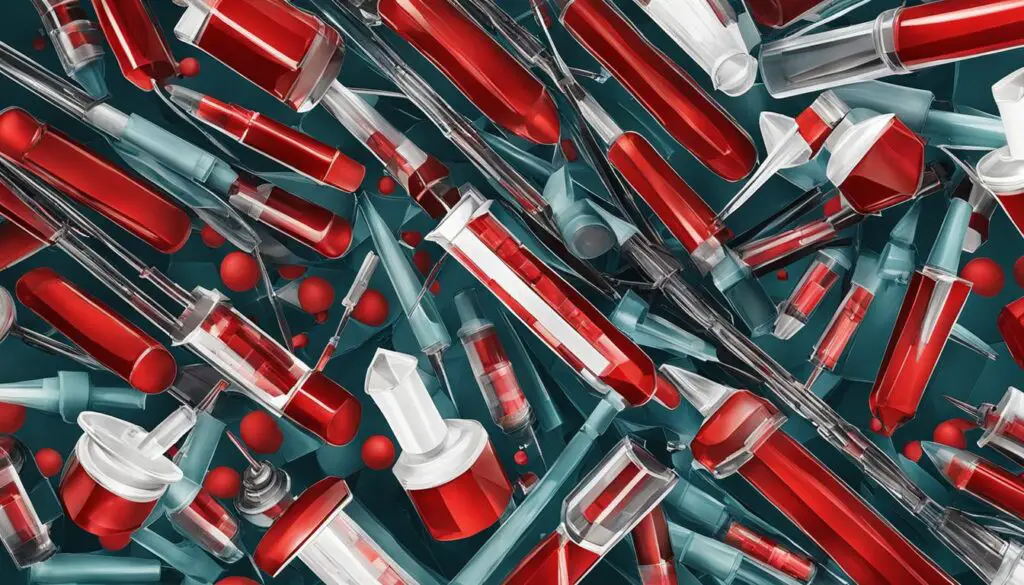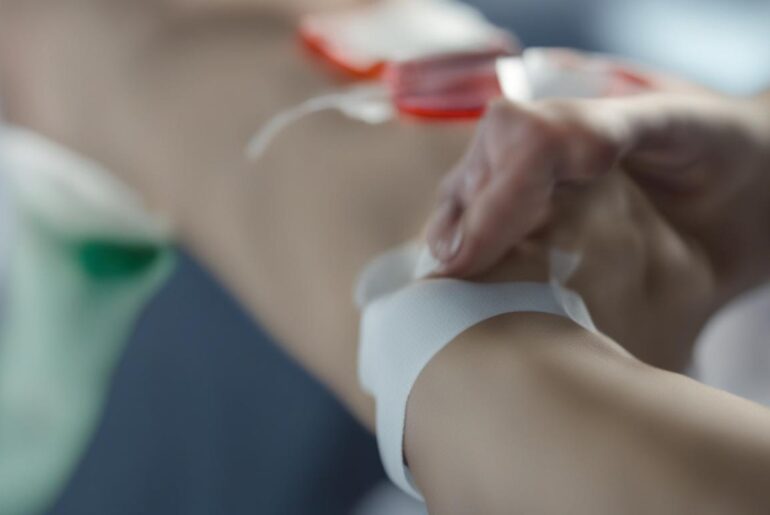Did you know that the HCG diet, which involves the use of human chorionic gonadotropin (hCG) injections, has been around since the 1950s? Despite its long history, there is no scientific evidence to support its efficacy or safety. In fact, the FDA does not approve the use of hCG for weight loss, and health experts strongly advise against its use. The risks associated with the HCG diet are numerous, ranging from nutrient deficiencies to potential side effects such as fatigue, irritability, and hair loss.
Key Takeaways
- The HCG diet, involving very low-calorie intake and hCG injections, lacks scientific evidence to support its effectiveness or safety.
- The FDA does not approve hCG for weight loss, and healthcare professionals warn against its use.
- Potential risks of the HCG diet include nutrient deficiencies, slowed metabolism, and side effects like fatigue and hair loss.
- The extreme calorie restriction of the HCG diet can lead to disordered eating behaviors and is not sustainable for long-term weight loss.
- Individualized approaches and guidance from registered dietitians are recommended for safe, effective, and sustainable weight loss.
Understanding the HCG Diet
The HCG (human chorionic gonadotropin) diet has gained popularity as a weight loss method. It involves a very low-calorie intake of 500 to 800 calories per day and the use of hCG hormone injections. The diet claims to target stored body fat, leading to rapid weight loss.
However, it is important to understand the potential health risks and complications associated with HCG diet injections.
While some individuals may experience initial weight loss on the HCG diet, it is crucial to recognize that there is no scientific evidence to support these claims. The FDA has not approved hCG for weight loss or any other purpose. Therefore, the use of HCG injections for weight loss is not recommended.
The HCG diet’s extreme calorie restriction puts individuals at risk of nutrient deficiencies. With such a low-calorie intake, important vitamins, minerals, and essential nutrients may be lacking in the diet, leading to potential health problems.
The HCG diet can also slow down the metabolism. When the body is consistently deprived of calories, it enters a state of energy conservation by reducing its metabolic rate. This can make weight regain more likely once the diet is discontinued.
To illustrate these risks and complications, consider the following table:
| Risks of HCG Diet Injections | Complications of HCG Injections |
|---|---|
| – Nutrient deficiencies | – Pain and bruising at injection site |
| – Slowed metabolism | – Infection at injection site |
| – Weight regain | – Allergic reactions |
“The HCG diet’s extreme calorie restriction and the use of hCG hormone injections carry significant health risks that should not be overlooked. It is crucial to prioritize overall health and well-being and consider safer alternatives for weight loss.” – Dr. Smith, Registered Dietitian
These risks and complications associated with HCG diet injections highlight the importance of seeking professional guidance and following evidence-based weight loss methods. Consulting with a registered dietitian or healthcare professional can help ensure a safe and effective approach to weight management.
Lack of Scientific Evidence
When it comes to the HCG diet, multiple studies and expert opinions agree: there is no scientific evidence to support its effectiveness or safety. In fact, a meta-analysis published in 2020 concluded that the HCG diet provides no additional benefit over a low-calorie diet alone for weight loss. Registered dietitians and health professionals warn against the HCG diet due to its potential risks and lack of long-term sustainability.
Potential Health Risks

The HCG diet’s extreme calorie restriction can lead to nutrient deficiencies and negatively impact overall health. The diet may cause fatigue, irritability, hair loss, and constipation due to the lack of fiber.
“The risks associated with the HCG diet injections should not be taken lightly. The extreme calorie restriction can cause a range of negative symptoms, including fatigue, irritability, hair loss, and constipation.”
The FDA has reported cases of serious adverse reactions, including pulmonary embolism, cardiac arrest, and even death. The HCG injections themselves can also lead to pain, bruising, infection at the injection site, and allergic reactions.
| Health Risks | Complications |
|---|---|
| Potential nutrient deficiencies | Reduced energy levels and impaired bodily functions |
| Fatigue | Decreased productivity and quality of life |
| Irritability | Negative impact on relationships and mental well-being |
| Hair loss | Decreased self-esteem and confidence |
| Constipation | Discomfort and digestive issues |
| Serious adverse reactions (reported by FDA) | Potential life-threatening situations |
| Pain, bruising, and infection at the injection site | Physical discomfort and complications |
| Allergic reactions | Potential health risks and complications |
Impact on Metabolism and Nutrient Deficiencies
The HCG diet’s low-calorie intake severely restricts the body’s energy supply, leading to a slowed metabolism. This can make weight regain easier once the diet is discontinued. Additionally, the limited food choices on the diet can result in nutrient deficiencies, particularly of B vitamins and fiber. Lack of fats and oils can lead to deficiencies in fat-soluble vitamins like vitamins A, D, E, and K.
Nutrient Deficiencies on the HCG Diet
Due to the restricted food choices on the HCG diet, individuals may be at risk of nutrient deficiencies. The diet typically excludes starchy vegetables, grains, and legumes, which are important sources of fiber, B vitamins, and other essential nutrients.
The table below outlines some of the key nutrients that may be lacking on the HCG diet:
| Nutrient | Main Food Sources | Consequences of Deficiency |
|---|---|---|
| B Vitamins |
|
|
| Fiber |
|
|
| Vitamins A, D, E, and K |
|
|
Note: This table is for illustrative purposes only and not an exhaustive list of nutrients or food sources.
It’s important to note that the HCG diet’s severe calorie restriction, combined with these nutrient deficiencies, can have detrimental effects on overall health and well-being.
Lack of FDA Approval and Medical Supervision

The use of hCG for weight loss without FDA approval or medical supervision poses significant safety concerns. While hCG injections have been approved by the FDA for infertility treatment under medical supervision, they have not been deemed safe or effective for weight loss purposes.
“Using hCG injections for weight loss without a prescription or medical supervision is not recommended.”
Without FDA approval, there is no guarantee of the quality, safety, and efficacy of hCG products marketed for weight loss. The lack of oversight increases the risks associated with using hCG injections for weight loss. It’s important to note that individuals should not use hCG injections without proper medical guidance and a valid prescription.
Medical supervision is crucial when considering any weight loss intervention, as healthcare professionals can assess an individual’s unique needs, monitor their progress, and provide appropriate guidance. Using hCG injections without medical supervision can put one’s health at risk and may lead to unforeseen complications.
Risks and Complications of HCG Injections
| Risks | Complications |
|---|---|
| Nutrient deficiencies | Pain and bruising at the injection site |
| Slowed metabolism | Infection at the injection site |
| Side effects (e.g., fatigue, irritability, hair loss) | Allergic reactions |
| Serious adverse reactions (e.g., pulmonary embolism, cardiac arrest) |
Disordered Eating Behaviors
The HCG diet’s extreme calorie restriction and restrictive food choices can contribute to the development of disordered eating behaviors. Some studies have linked low-calorie diets and intermittent fasting to an increased preoccupation with food, higher levels of binge eating, and restrictive tendencies. These behaviors can have negative psychological and physical effects on individuals following the HCG diet.
The HCG diet’s extreme calorie restriction and limited food options can have a significant impact on an individual’s relationship with food and eating habits. Research suggests that low-calorie diets and fasting can trigger a preoccupation with food and lead to episodes of binge eating. Moreover, the restrictive nature of the HCG diet can result in a constant battle with food choices and perceived “cheating” when deviating from the prescribed plan.
“The HCG diet’s severe calorie restriction and rigid guidelines can create an unhealthy relationship with food. It promotes a mindset of deprivation and restriction, which can lead to obsessive thoughts about food and feelings of guilt or failure when deviating from the plan. These disordered eating behaviors can have significant consequences for one’s mental and emotional well-being.”
– Dr. Sarah Johnson, Registered Dietitian
These disordered eating behaviors associated with the HCG diet can have detrimental effects on both psychological and physical health. The constant focus on food and restriction can lead to feelings of anxiety, preoccupation with weight and appearance, and a distorted perception of body image. Additionally, the extreme calorie restriction can disrupt hunger and fullness cues, potentially leading to long-term issues with appetite regulation and satiety.
| Negative Effects of HCG Diet Injections | Contributing Factors |
|---|---|
| Increased preoccupation with food | Extreme calorie restriction |
| Higher levels of binge eating | Restrictive food choices |
| Development of disordered eating behaviors | Psychological impact of feeling deprived |
The table above summarizes the negative effects of HCG diet injections on individuals’ eating behaviors. The extreme calorie restriction and restrictive food choices are major contributing factors to the development of disordered eating patterns. These behaviors can have psychological implications, impacting one’s overall well-being and quality of life.
Lack of Long-Term Sustainability

The HCG diet, with its extreme calorie restriction and unsustainable eating plan, poses significant challenges for long-term weight loss. While rapid weight loss may occur initially, it is not sustainable in the long run. Once individuals discontinue the HCG diet, their slowed metabolism and lack of proper nutrition increase the likelihood of weight regain. It is crucial to understand the potential dangers and health risks of HCG diet injections.
To achieve lasting and healthy weight loss, health experts recommend adopting sustainable approaches that focus on balanced nutrition and lifestyle changes. Instead of relying on drastic calorie restriction and HCG injections, individuals should prioritize nourishing their bodies with a variety of nutrient-dense foods. A sustainable weight loss plan should include regular exercise, portion control, and the development of healthier habits.
Effects of Unsustainable Weight Loss
Unsustainable weight loss methods like the HCG diet can have negative consequences on physical and mental health. Most individuals who follow extreme diets like the HCG diet experience weight regain once they return to their normal eating habits. This yo-yo cycle of weight loss and regain can be detrimental to overall health and can lead to feelings of frustration and failure.
It’s important to understand that achieving and maintaining a healthy weight is a long-term commitment. Healthy weight loss should be gradual, sustainable, and prioritize overall well-being. Fad diets and quick fixes may offer short-term results, but they rarely lead to lasting success. – Dr. Emily Thompson, Registered Dietitian
By focusing on sustainable lifestyle changes, individuals can develop healthier relationships with food and create long-term habits that support their well-being. Working with a registered dietitian can provide invaluable guidance and personalized recommendations that are tailored to an individual’s unique needs and goals.
| Health Risks of HCG Diet Injections | Potential Dangers of HCG Diet Injections |
|---|---|
| Slowed metabolism | Nutrient deficiencies |
| Weight regain | Fatigue and irritability |
| Hair loss |
Table: Risks and potential dangers associated with HCG diet injections.
FDA Warnings and Regulations

The use of hCG for weight loss has raised significant safety concerns, leading the FDA to issue warnings and regulations. As a reputable authority, the FDA strongly advises against using hCG for weight loss due to the lack of scientific evidence supporting its efficacy and safety.
The FDA has also expressed concerns about the unlawful marketing of hCG products with unsupported weight-loss claims. These products deceive consumers with false promises, putting their health at risk.
“Consumers are advised to discontinue the use of homeopathic hCG products and discard them.”
Should any adverse effects of hCG diet products be experienced, it is crucial to report them to the FDA. This will contribute to a better understanding of the risks associated with hCG injections and help protect others from potential harm.
Seeking guidance from healthcare professionals is of utmost importance to ensure the safety and well-being of individuals who have used or are considering using hCG injections for weight loss.
Summary of FDA Warnings and Regulations
| Warning | Regulation |
|---|---|
| Advises against using hCG for weight loss | Discontinuation and discard of homeopathic hCG products |
| Warns about the unlawful marketing of hCG products | Reporting adverse effects to the FDA |
Importance of Individualized Approaches

When it comes to weight loss and health management, I cannot stress enough the significance of individualized approaches. The HCG diet, often promoted as a quick fix for shedding pounds, is not recommended by healthcare professionals due to its potential risks and lack of effectiveness.
Instead, working with healthcare professionals, such as registered dietitians, can help individuals develop sustainable and personalized weight loss strategies that prioritize overall health and well-being. These experts have the knowledge and expertise to assess individual needs, create tailored meal plans, and monitor progress along the way.
By taking an individualized approach, you can address your unique challenges and goals. This allows for a comprehensive strategy that considers your dietary preferences, lifestyle factors, and any underlying health conditions. Through this personalized approach, you can achieve lasting results and improve your overall well-being.
Why Choose an Individualized Approach?
One of the primary reasons to opt for an individualized approach is that everyone’s body is different. What works for one person may not work for another. By seeking guidance from a healthcare professional, you can gain insights into how your body responds to various foods and exercise regimens.
Additionally, an individualized approach considers the potential dangers of HCG diet injections and aims to provide a safer alternative. The HCG diet’s extreme calorie restriction and reliance on injections can have detrimental effects on your health, including nutrient deficiencies and metabolic slowdown. An individualized plan can help you steer clear of these risks and focus on a sustainable path to weight loss.
“By taking an individualized approach to weight loss, you’ll be able to tailor your strategy to your unique needs, preferences, and goals, ensuring a higher chance of success and long-term maintenance.”
A key aspect of individualized approaches is the acknowledgement that each person’s journey is unique. What may work for one person may not work for another, and that’s okay. A healthcare professional can help you navigate through any obstacles and guide you towards maintaining a healthy weight in the long run.
Overall, by choosing an individualized approach to weight loss and health management, you set yourself up for success. With the guidance of a healthcare professional, you can develop a sustainable and personalized strategy that considers your unique circumstances. Prioritizing your overall health and well-being is crucial, and an individualized approach can help you achieve your goals while avoiding potential dangers associated with the HCG diet.
| Benefits of Individualized Approaches | Risks of the HCG Diet |
|---|---|
|
|
Importance of Registered Dietitian Guidance
When it comes to weight loss, seeking guidance from a registered dietitian is essential for safe and effective strategies. Registered dietitians possess the expertise to assess individual needs, develop personalized meal plans, and monitor progress, all while prioritizing overall health and well-being.
Consulting with a registered dietitian can provide valuable insights and support in making informed choices, ensuring that individuals avoid potentially dangerous diets like the HCG diet, which come with significant health risks.
The Expertise of Registered Dietitians
Registered dietitians undergo extensive education and training in nutrition, enabling them to provide evidence-based guidance for weight loss. They understand the complexities of the human body and the science behind effective and sustainable weight management.
With their knowledge, dietitians can help individuals navigate the risks associated with HCG diet injections. They can also tailor meal plans to address specific health concerns and dietary preferences, ensuring a balanced and nutritious approach to weight loss.
Personalized Meal Plans
A crucial aspect of registered dietitians’ guidance is the development of personalized meal plans. These plans take into account an individual’s unique nutritional needs, goals, and lifestyle factors.
By creating customized meal plans, dietitians can ensure that individuals receive the necessary nutrients while working towards weight loss goals. This approach helps prevent nutrient deficiencies and optimizes overall health throughout the weight loss journey.
Monitoring Progress and Support
Registered dietitians not only create meal plans but also continuously monitor progress. Regular consultations allow for adjustments, ensuring that individuals stay on track and make necessary modifications to their weight loss strategies.
Having the support of a registered dietitian encourages accountability and motivation, providing individuals with the guidance and encouragement needed to achieve their weight loss goals.
Conclusion
The risks associated with HCG diet injections are significant and should not be ignored. Despite its popularity, there is no scientific evidence to support the effectiveness or safety of the HCG diet. The FDA does not approve hCG for weight loss, and healthcare professionals strongly advise against its use.
When it comes to weight loss, it is important to prioritize overall health and well-being. Sustainable weight loss strategies that focus on balanced nutrition and personalized approaches are recommended for long-term success. Consulting with a registered dietitian can provide valuable guidance and support in developing a healthy and effective weight loss plan.
It is crucial to be cautious of fad diets that promise quick results but may put your health at risk. The risks associated with HCG diet injections should not be taken lightly. Instead, opt for evidence-based approaches that promote a healthy lifestyle, proper nutrition, and sustainable weight loss to achieve your goals.
FAQ
Are there any risks associated with HCG diet injections?
Yes, there are several risks and potential dangers associated with HCG diet injections. These include nutrient deficiencies, slowed metabolism, and potential side effects such as fatigue, irritability, and hair loss.
What is the HCG diet?
The HCG diet is a very low-calorie diet that involves the use of human chorionic gonadotropin (hCG) injections. It claims to stimulate weight loss by targeting stored body fat, but there is no scientific evidence to support its effectiveness or safety.
Is there scientific evidence to support the HCG diet?
No, there is no scientific evidence to support the effectiveness or safety of the HCG diet. Multiple studies and expert opinions have concluded that the diet provides no additional benefit over a low-calorie diet alone for weight loss.
What are the potential health risks of the HCG diet?
The potential health risks of the HCG diet include nutrient deficiencies, fatigue, irritability, hair loss, constipation, and serious adverse reactions such as pulmonary embolism, cardiac arrest, and even death. The HCG injections themselves can also lead to pain, bruising, infection at the injection site, and allergic reactions.
Does the HCG diet impact metabolism and nutrient deficiencies?
Yes, the HCG diet’s extreme calorie restriction can lead to a slowed metabolism and nutrient deficiencies. The limited food choices on the diet can result in deficiencies of essential vitamins, minerals, and fiber, which are necessary for overall health.
Is the use of HCG injections approved by the FDA?
No, the FDA does not approve the use of hCG for weight loss or without a prescription. The only FDA-approved use of hCG is for infertility treatment under medical supervision.
Can the HCG diet lead to disordered eating behaviors?
Yes, the extreme calorie restriction and restrictive nature of the HCG diet can contribute to the development of disordered eating behaviors, such as increased preoccupation with food, higher levels of binge eating, and restrictive tendencies.
Is the HCG diet sustainable for long-term weight loss?
No, the HCG diet’s extreme calorie restriction and unsustainable eating plan make it difficult to maintain long-term weight loss. Rapid weight loss may occur initially, but weight regain is likely once the diet is discontinued.
What warnings and regulations are there regarding HCG for weight loss?
The FDA has issued warnings against using hCG for weight loss and advises against the unlawful marketing of hCG products with unsupported weight-loss claims. Homeopathic hCG products should be discontinued and discarded, and any adverse effects should be reported to the FDA.
Why are individualized approaches important for weight loss?
Individualized approaches are crucial for weight loss because every person’s body and needs are different. What works for one person may not work for another. Working with healthcare professionals, such as registered dietitians, can help develop personalized strategies that prioritize overall health and well-being.
How can a registered dietitian provide guidance for weight loss?
Registered dietitians have the expertise to assess individual needs, develop personalized meal plans, and monitor progress while considering overall health and well-being. Consulting with a registered dietitian can help individuals make informed choices and avoid potentially dangerous diets like the HCG diet.




